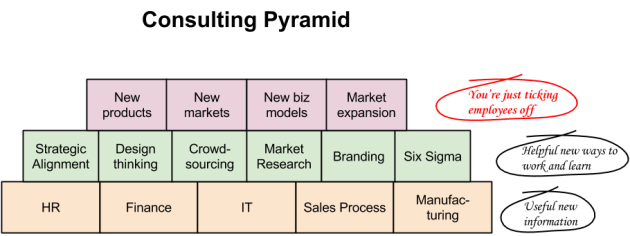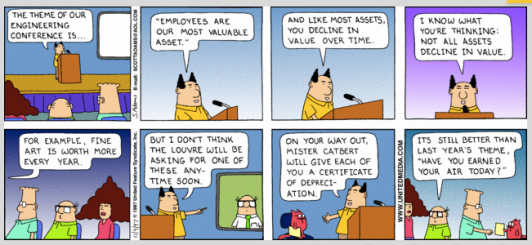Finally, remember Innovation won’t come from plans or people outside your company – it will be found in the people you already have inside who understand your company’s strengths and its vulnerabilities.
Steve Blank, Esade Business School Commencement Speech
I think Steve Blank – well-respected thinker on innovation and entrepreneurship – has hit a key point in his speech. A company’s employees are exactly the right people to enlist in innovation efforts. Here are the qualities that make employees uniquely qualified:
- Deep knowledge about customers
- Understanding why customers leave
- Strong interest in the company’s future
- Internal informal networks to move things forward
- Vast reservoir of existing ideas and insight about future possibilities
Organizations are starting to take these amazing attributes seriously as they think about innovation. I’ve seen some forward-thinking organizations involving employees in the process of moving forward. But not all, certainly not a majority yet. For many senior executives, consultants are still the preferred means to think about and design the future.
Consulting’s impact on employees
In my history, I’ve seen how consulting has been used in organizations, as an employee, a consultant and an observer. I sort the types of consulting into three levels of a pyramid:
The bottom level is consulting around specific functions. Towers Watson, for instance, focuses on HR and financial issues. This consulting is helpful in bringing new information to the employees in these functions. Consultants here see a lot of what works, and what doesn’t. With both their expertise and experience, they make people smarter in the core supporting functions of organizations.
The middle level is more about enablement across different groups. This consulting brings new philosophies and frameworks to employees. It enhances people’s ability to think about addressing the key strategic factors that impact the business. My own work consulting on crowdsourced innovation is one such example. Consulting firm Deloitte offers Lean Six Sigma consulting. This level of the consulting pyramid works in concert with what motivates employees and helps them be better in their jobs.
The top level is best characterized as strategy consulting. These firms (e.g. McKinsey) look at a company, its assets and its markets, and design a future path for the organization. This can include new markets to go after, expanding in existing markets, new products to offer and new business models. This is what I call Consultant-Led Innovation. It is actually really valuable, but can also result in demoralizing employees.
Do outsiders really know better?
I’ll relate my own experience here, see if it resonates with you. When I was at Pay By Touch, the CEO decided to bring in a well-known consulting firm. Their mandate was to examine the payments market and determine how Pay By Touch should tackle it. After doing their research and executive interviews, they came up with a strategy for pricing, and new products for a biometric wallet. I remember attending their presentation to a packed room of employees. The room was packed because it felt like the CEO was going to go with their recommendations, and people wanted to know what the consultants were thinking.
After seeing the presentation, the collective employee reaction? Meh. It suffered from two issues. First, it wasn’t anything that hadn’t been part of the discussion internally. Second, it had some fundamental flaws that people who’d been working on the edge of the evolving payment industry would have known. Unsurprisingly, their recommendations went to the shelf without further action.
But that experience always left me with a bad taste. Why didn’t the CEO call on his own people to do this strategic thinking? He’d hired smart people who knew credit cards, ACH, point-of-sale systems, etc. People who joined the company to change the way we pay. But instead of leveraging that, he brought in the consultants.
Outside consultants aren’t going to know your business – customers, markets, competitors, products – better than your employees.
Diverse perspectives and who is motivated most
I’ve written previously about how valuable cognitive diversity is. And the strategy consultants do add to that cognitive diversity. They have smart people who bring strong analytic perspectives to your business. The problem arises when their perspectives, their voices are the dominant basis of thinking for the C-Suite.
It’s an in-your-face dismissal of your “most valuable asset”, your employees.
As I’ve described previously, the key to successfully engaging employees and having them help lead the company’s innovation is for senior executives to set a course forward and ensure that innovation obstacles don’t stifle progress. Strategy consultants actually can be useful here, in that they can help an executive crystallize thinking about the future. After that, enlightened organizations know their employees have the smarts, knowledge and motivation to work out the future. And better than some strategy inserted from outside, when employees help determine the organization’s future, their enthusiasm and energy will be critical to achieving the outcomes expected.
Don’t rely on consultant-led innovation. Make sure you’re building through the amazing cognitive diversity and energy of your employees.





